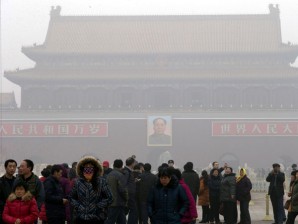
Visitors stand on Tiananmen Square across from a portrait of former Chinese leader Mao Zedong in thick haze in Beijing Tuesday, Jan. 29, 2013. Extremely high pollution levels shrouded eastern China for the second time in about two weeks Tuesday, forcing airlines in Beijing and elsewhere to cancel flights because of poor visibility and prompting government warnings for residents to stay indoors. (AP Photo/Ng Han Guan)
BEIJING – Residents across northern China battled through choking pollution at extreme levels on Tuesday, as Beijing was plunged into toxic twilight for the fourth time this winter.
Visibility was reduced to around 200 meters in parts of the capital, where mask-wearing pedestrians made their way through a murky haze, despite warnings from authorities to stay indoors unless absolutely necessary.
In a Beijing city office visited by AFP, up to 20 workers worried that the pollutants could penetrate indoors took extra precautions, wearing gas-mask style protective headgear at their desks.
State broadcaster China Central Television (CCTV) gave the smog’s second day huge airplay, showing vehicles using full headlights in mid-morning to light their way through the noxious cloud over huge swathes of northern China.
More than 100 flights were delayed or cancelled at Zhengzhou Airport in Henan, said CCTV, adding that the haze would last until Thursday.
In the eastern province of Shandong, almost 2,000 passengers were stranded at Qingdao’s main airport after it shut with 20 flights cancelled as visibility dropped to 100 metres, according to the official Xinhua news agency.
Beijing’s winter of smog has sparked an Internet outcry and anger from state media.
The China Daily reiterated its calls for firm action on Tuesday, directing them at the capital’s newly-installed mayor Wang Anshan, who formally took over on Monday.
“What do Beijing residents expect of their new mayor?” asked the newspaper in an editorial. “Of all the things that need improving, cleaner air will be at the top of many people’s wish list.”
Wang was quoted by Xinhua as saying: “The current environmental problems are worrisome.”
The Beijing News went as far as to suggest banning or regulating next month’s traditional and hugely popular New Year fireworks in the capital. Pollution readings spiked last year after the city’s skyline lit up with explosions.
Celebrity bloggers — including real estate tycoon Pan Shiyi and reform-minded investor Xue Manzi, who have a combined 24 million followers on China’s microblogging sites — called for legislation against pollution.
The US embassy’s air quality index (AQI) reading for Beijing stood at 457 and “hazardous” at 5pm on Tuesday, after having reached 517, or “beyond index”, at 6am.
The index rates a reading over 150 as “unhealthy”, above 300 as “hazardous”, while anything over the upper limit of 500 is regarded as “beyond index”.
Meanwhile, the Beijing Municipal Environmental Monitoring Centre gave the figure as 406, indicating the capital’s air was “severely polluted”.
The toxic air follows an extreme bout of pollution earlier this month, when state media said readings for PM 2.5, particles small enough to deeply penetrate the lungs, peaked at 993 micrograms per cubic metre, almost 40 times the World Health Organization’s recommended safe limit.
At the height of the smog, many residents rushed to buy face masks and air purifiers, and doctors at two of Beijing’s major hospitals said the number of patients with respiratory problems had increased sharply during the period.
China’s pollution problems are blamed on the country’s rapid urbanisation and dramatic economic development.
But experts have raised questions over China’s will and ability to tackle car and coal use, which are seen as key causes of the phenomenon.